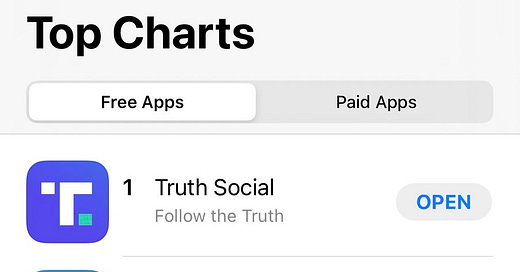Censorship had a big week, from Elon Musk and conservatives’ claims of social media bias to actual book bans. We’ll take a look at the way beauty and body modifications are taking social media (and advertising) by storm, consider two universities’ latest efforts to correct past mistakes, and reflect on whether paparazzi photos of celebrities carrying their latest read could be even more staged than you might expect.
💡ON OUR MINDS
Elon Musk takes on Twitter
On Monday, the world’s richest man Elon Musk struck a deal to acquire Twitter for $44 billion, making the future of the platform anyone’s guess. As the story continues to evolve, we’re particularly interested in the conversation this acquisition is bringing up around social media censorship.
Since announcing his plans, Musk has repeatedly expressed his interest in bolstering free speech on the platform to "unlock" Twitter's "extraordinary potential” amid his suggestions that the platform engages in censorship.
Outspoken conservatives like Sen. Ted Cruz have quickly capitlized on the opportunity to discuss free speech on social media, a sensitive topic that strikes a chord for the masses, as roughly half of Republicans feel they cannot express themselves freely on platforms like Twitter and Facebook.
However, MIT and Yale researchers found that while Republican users tend to be suspended from Twitter more often than Democrats, Republicans are also more likely to share misinformation that would provoke such suspensions.
The question remains whether the deal will even go through - expected to close in October 2022, the parties have to stick to their agreed-upon rules, which Musk seems to be having difficulty with. The terms of his deal to acquire Twitter allow Musk to tweet about his acquisition “so long as such tweets do not disparage the Company or any of its Representatives.”
Meanwhile, Musk has already begun firing off tweets criticizing current Twitter leadership or comparing Twitter’s downloads to that of Trump’s Truth Social - though the tweets don’t directly mention the acquisition, and thus may not be subject to the deal terms.
As The Atlantic staff writer Charlie Warzel puts it, “There is a single steadfast rule for being alive right now, and it is: Do not bet against the dumbest possible outcome.”
All that glitters isn’t gold (it’s probably filler)
Dove, a company that has not shied away from challenging traditional beauty standards, recently released a new video as part of a social experiment with deepfake technology to expose the dangers of toxic beauty advice online. “The #DetoxYourFeed campaign, created by Ogilvy, aims to empower teens to define their own beauty standards and unfollow anything on social media that doesn’t make them feel good about themselves,” according to Adweek.
Notably, Ogilvy UK announced earlier this month that it will “no longer work with influencers who edit their bodies or faces for ads,” timed as the UK government reviews the Digitally Altered Body Image Bill that would require an influencer to disclose edited content.
Meanwhile, NBC published an article this week exposing how lots of young adult influencers are being offered free or discounted botox, filler, and more in exchange for social media promotion. “It’s a dynamic that many young social media personalities now experience, a feedback loop of free or cheap cosmetic procedures that also boost their views, making them even more lucrative targets for clinics and practitioners selling such procedures.”
As hashtags like “plasticsurgery” and “lipfiller” continue to boom in popularity (26 billion views to date on TikTok), social media platforms need to decide if and when to step in. For example, TikTok doesn’t allow cosmetic procedures or providers to advertise through official TikTok ads, but those rules don’t apply to videos that aren’t considered branded advertising.
While it’s nice to see more awareness of the pressures that social media can put on users — especially those who are younger — to meet unrealistic beauty standards, the issue is nuanced and widely pervasive across social media and IRL, making it more difficult to find a meaningful solution.
🏆 BRAND WIN OF THE WEEK: Brooklyn Public Library
When Florida isn’t feuding with Disney, they’re banning books. Walton County has moved forward with a plan to remove 58 titles from library circulation. The list includes everything from classics by Toni Morrison to basic sex education texts to Sally Rooney’s zeitgeisty Normal People.
This isn’t an isolated incident. Bans like this are quietly coming into effect all over the country in record numbers. A significant number of the books directly engage with matters of race or sexuality. Once again, the library has become a battleground in the culture wars.
With young people across the country losing access to powerful, informative, and life-affirming literature, the Brooklyn Public Library has stepped up to meet the moment. They recently announced that every teenager in the United States is now eligible for a BPL library card, which allows them to check out ebooks and audiobooks from anywhere. If a teen can’t check out a hard copy of a banned book in their hometown, they can always check out a digital one via BPL. In a move directly designed to combat censorship, some ebooks will be “always available.” They’re calling this program “Books Unbanned.”
Brands can learn a lot about ESG strategy from this move. The BPL recognized a widespread pain point quickly and responded in a way that only they could. They’ve spread access to important books and called attention to an important ongoing issue. At the same time, they’ve driven awareness and positioned themselves as a leader in the fight for free speech.
📡 ON OUR RADAR
There’s no way around it: apologies are hard. This HBR article calls out the harmful impact of so-called “non-apologies,” DEI statements that come off as obligatory and insincere. If your brand needs to issue a statement like this, it’s important to be authentic. Consumers don’t just want to read the press release, they want to see that you mean it.
The return to the workplace is a gift to reporters that just keeps giving. This week, a bill was introduced in the California General Assembly that would create a set of privacy standards for employers’ to adhere to regarding workplace monitoring and surveillance tools. It comes as greater focus has been placed on how employers’ are monitoring their workers’ productivity in remote settings. Though, amidst The Great Resignation, even the slightest of monitoring practices is a hard sell to potential employees.
While Harvard announced a plan to redress the institution’s ties to slavery with a $100 million “Legacy of Slavery Fund,” it was careful to sidestep one commitment: direct financial reparations. It’s made all the more interesting when we remember how Georgetown, five years ago, announced its plan to provide financial aid to descendants of the enslaved people formerly sold to the college. One Harvard professor and the committee chair, Tomiko Brown-Nagin, said that fixating on the term reparations can be “counterproductive,” though it hasn’t stopped the media from using it to characterize the plan.
To recognize and acknowledge historical wrongs endured by Native Americans, the University of California systems will waive tuition and fees beginning in Fall 2022 for Native American students who are state residents and members of federally recognized tribes. And thanks to a separate new scholarship fund, federally unrecognized tribes will also get free tuition. Time will tell if these initiatives will increase the Native American demographic, which currently makes up less than 1% of UC’s student body.
In the immediate aftermath of the Elon Musk/Twitter news, many high-profile users began to voice curiosity about why their follower counts were fluctuating. Twitter later confirmed that it was a result of “organic” activity, as existing users deactivated their accounts and others joined the app. Unfortunately for Katy Perry, that meant losing 200,000 Katy Cats, while Rep. Marjorie Taylor Green gained more than 90,000 followers — causing many to wonder if Elon’s move will be a continued win for conservative voices on the platform going forward.
Despite notable challenges over the past few years, the NYTimes Opinion section is on the rise. Axios spoke with Kathleen Kingsbury, opinion editor of the Times, about how the Opinion room has doubled in size since 2017. According to Kingsbury, Opinion is among the best vehicles for retaining subscribers and the combination of multimedia projects, popular opinion podcasts, and a growing diversity among writers represents both a maturation of the section plus a clear consumer demand for this type of content. Looking forward, Kingsbury says the Opinion section's focus will continue to expand and go deeper on emerging topics like mental health, technology, free speech, and the future of government.
The fitness industry often proclaims new programs or products are perfect for beginners, but as the Atlantic’s Amanda Mull points out, they often leave most Americans who lack the basic skills behind.
🥊QUICK HITS:
In case you missed these stories this week.
Thought you had celebrities figured out? Think again. Fashion influencers and celebs are hiring “book stylists” to select books (or props) for them to carry out in public or post on Instagram. But hey, they’re just like us!
The pandemic is changing home design - from built-in offices to home gyms and playrooms meant to accommodate the lifestyles of people who live and work from home.
Is North Carolina the Silicon Valley of the Metaverse? Tech, social media, and gaming jobs are exploding in the region, especially in the triangle between Duke University, North Carolina State University, and the University of North Carolina Chapel Hill.
We’ll see you here next week! 👋
HL
===
The fine print: This week’s newsletter is brought to you by the new owner of “Quarts”






